Malaria and Maleah
This past February, Mary, our oldest daughter, underwent a critical pre-natal stress when she was eight months pregnant. Two weeks later, we laid to rest the remains of her daughter named Maleah Alyce Burrell. Yes, Maleah has a name, and we will use it to remember a life worthy of life, worthy of remembrance, even though it was hardly begun.
Deeply seared on my mind is my dear Mary's grimaced face of pure, undiluted disappointment. As if her dreams were crumbling to dust, slipping through her hands, as she watched the pink miniature casket of her baby, a mother’s many hopes for the future, lowered into the cold Chicago ground. New snow was caked on the leafless branches of old oaks and sugar maple trees, as we walked arm and arm as a family. Under that cotton canopy, frosted fantasy-land, it was such a strangely beautiful, but barrenly unreal thing, like this utterly dreadful surprise of death. Prayers were prayed. Then, the former football player and father of the baby, the one who, with me, carried the casket, grabbed a shovel and in a fitting release for his loss and his love, muscularly, he pushed the first dirt into the hole where Maleah will await the resurrection of her glorified body.
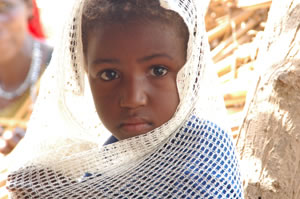 Though death is against us, God is for us, in the risen Christ! Malaria is against us, but God is for us. Two thousand times a day on average, what happened in my family is repeated in similar rituals around the world. Parents lose daughters and sons whose names we do not know. Two thousand times a day a mother says goodbye to her child because of malaria, one every 30 seconds, on average. In my opinion, their losses are magnified by the fact that ending death due to malaria is something we can do something about. Let us be led by the Holy Spirit to bring healing to the world.
Though death is against us, God is for us, in the risen Christ! Malaria is against us, but God is for us. Two thousand times a day on average, what happened in my family is repeated in similar rituals around the world. Parents lose daughters and sons whose names we do not know. Two thousand times a day a mother says goodbye to her child because of malaria, one every 30 seconds, on average. In my opinion, their losses are magnified by the fact that ending death due to malaria is something we can do something about. Let us be led by the Holy Spirit to bring healing to the world.
Lutherans Making a Difference
Lutherans are Christ-centered. We believe that the paramount expression of God’s compassion for the world is revealed in the life and witness, sufferings and resurrection of Jesus Christ. Now, in Jesus’ name we are a resurrected people, rising up against life-destroying diseases. Jesus, who mystically identifies himself with the “least of these,” calls us in our baptisms to commit our resources to “help and support our neighbor in every physical need,” Luther’s Small Catechism would say—even those forgotten and forsaken neighbors in the far corners of the earth.
Our goal at Lutheran World Relief (LWR) through the Lutheran Malaria Initiative (LMI) is to put an end to mothers having to bury their children due to malaria. Working with the Evangelical Lutheran Church in America (ELCA) and The Lutheran Church—Missouri Synod (LCMS) we aim to raise $75 million to eradicate the threat of malaria on the continent of Africa by 2015!
I shared Maleah’s story and our malaria goal during a keynote address I delivered recently for the ALDE conference, the Association of Lutheran Development Executives. Many in the room are savvy fund raisers with sophisticated “radars” for mere campaign rhetoric. These professionals broke into spontaneous applause. One day it will be said what the Lutherans did, motivated by the Gospel, to put an end to malaria, like Wheat Ridge Ministries worked to end tuberculosis and the Rotary Clubs worked to end polio. Eight million Lutherans mobilized in congregations, on Lutheran college campuses, in elementary and high schools, will raise both awareness and dollars to make a big difference.
Why Malaria?
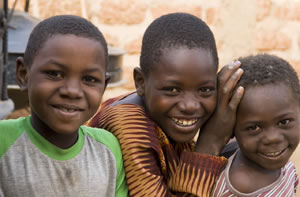 When we talked to LWR staff around the world about the potential for this malaria-specific effort, they also responded with an overwhelming applause. “Yes! That’s our number one challenge.” So much of Lutheran World Relief’s development work in Africa focuses on livelihoods, which means helping people to work their own way out of poverty toward full human flourishing. The World Bank defines extreme poverty as not having enough income to meet the most basic human needs for adequate food, water, shelter, clothing, sanitation, health care, or education.
When we talked to LWR staff around the world about the potential for this malaria-specific effort, they also responded with an overwhelming applause. “Yes! That’s our number one challenge.” So much of Lutheran World Relief’s development work in Africa focuses on livelihoods, which means helping people to work their own way out of poverty toward full human flourishing. The World Bank defines extreme poverty as not having enough income to meet the most basic human needs for adequate food, water, shelter, clothing, sanitation, health care, or education.
Our approach provides international, community-based and faith-based organizations with access to the resources they need to help them develop their own God-given assets to escape economic poverty. But, if you are sick or your children are sick or you or those you love are on their deathbeds due to malaria, of course you can’t work. If you can’t work the field and you’re too sick to harvest crops, you have nothing to sell at market, which means you have no money to buy food or medicine or school supplies, and you’re caught in a vicious cycle of sickness, under-education, undermined dignity and suffering. That’s why malaria is such a destructive disease of poverty. Learn more about malaria.
Learning as We Go
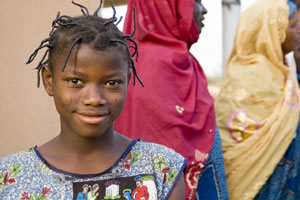 Our faith teaches us that there are multiple ways to be poor, multiple dimensions to poverty. Some of the so-called poorest people on the planet possess riches we do not; possess a wealth of spirit by which we can be inspired, a wealth of innovation from which we can learn. As we involve ourselves in LMI, engaging global communities, I believe we and our children will learn and grow. For example, we may come to understand better:
Our faith teaches us that there are multiple ways to be poor, multiple dimensions to poverty. Some of the so-called poorest people on the planet possess riches we do not; possess a wealth of spirit by which we can be inspired, a wealth of innovation from which we can learn. As we involve ourselves in LMI, engaging global communities, I believe we and our children will learn and grow. For example, we may come to understand better:
- the blessings of good health and health care we ourselves typically have and take for granted
- what it means to be more faithful stewards of our God-given resources
- how becoming more involved in global causes reinforces our faith
- differences in people and increased multi-ethnic sensitivity
- the catholicity of the church—spanning continents and cultures
- how some of the financially poorest communities in the world possess exuberant joy in their faith, strong family ties, and an unpredictably high level of humanly undefinable happiness
- what it feels like to be emboldened, standing with others who themselves stand courageously, even in seemingly abandoned situations
- just how deadly a mosquito bite can be.
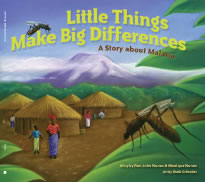 Monique Nunes, my wife, is a Lutheran educator and administrator at Baltimore Lutheran School. We are coauthors of a new children’s book called Little Things Make Big Differences. It will be released in early July. Set in Tanzania, it follows a family that fights in faith to overcome malaria. It shows practical ways for churches, youth groups, and schools to get involved with proven interventions.
Monique Nunes, my wife, is a Lutheran educator and administrator at Baltimore Lutheran School. We are coauthors of a new children’s book called Little Things Make Big Differences. It will be released in early July. Set in Tanzania, it follows a family that fights in faith to overcome malaria. It shows practical ways for churches, youth groups, and schools to get involved with proven interventions.
Partnering as We Work
“God, being rich in mercy, because of the great love with which he loved us… made us alive together with Christ.” Ephesians 2:4-5 What a lively togetherness we share as fellow-redeemed, children of a merciful Savior! We align our efforts for the sake of a wise combining of resources between St. Louis (LCMS), Baltimore (LWR) and Chicago (ELCA). To accomplish the goals of the Lutheran Malaria Initiative, LWR is working alongside these church bodies, with international community-based organizations, faith-based organizations, as well as with partner Lutheran church-bodies on the continent of Africa. Surveys consistently rate churches as the most trusted organizations in Africa (more than governments and businesses). We are thankful for our partnership with the United Nations Foundation, which gave us a grant to develop this campaign.
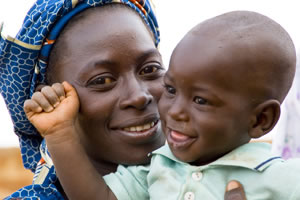 God has called us to work in God’s own mission in God’s own world. Because of sin—our devastating separation from God—this task is hard work, yet it’s as difficult as it is necessary. Unfortunately, Lutherans in the United States are also separated doctrinally from one another in the ecclesial realm. Our differing confessions of faith keep us from sharing altar and pulpit fellowship. One thing, however, we can share, indeed, must share, is our responsibility to make life more humane in the civic realm. For this reason, Lutheran World Relief was founded in 1945. We continue to put our mission into action: Affirming God’s love for all people, we work with Lutherans and partners around the world, to end poverty, injustice and human suffering. All Lutherans can endorse that!
God has called us to work in God’s own mission in God’s own world. Because of sin—our devastating separation from God—this task is hard work, yet it’s as difficult as it is necessary. Unfortunately, Lutherans in the United States are also separated doctrinally from one another in the ecclesial realm. Our differing confessions of faith keep us from sharing altar and pulpit fellowship. One thing, however, we can share, indeed, must share, is our responsibility to make life more humane in the civic realm. For this reason, Lutheran World Relief was founded in 1945. We continue to put our mission into action: Affirming God’s love for all people, we work with Lutherans and partners around the world, to end poverty, injustice and human suffering. All Lutherans can endorse that!
A recent, cautionary letter from the president of The Lutheran Church—Missouri Synod sent to church leaders of the LCMS talked about the need for understanding what we can and cannot do together. “To maintain such a distinction 1 carefully and conscientiously prevents both compromise of the teachings of the Christian faith and disregard of human needs which can be addressed more effectively by groups working together than by individuals or churches working on their own.” 2
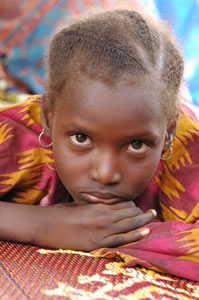 Working as We Pray
Working as We Pray
Malaria is a disease of poverty affecting primarily women and children living on the continent of Africa. Through interventions like insecticide-treated bed nets, education and artemisinin combination therapy (ACT), we can end countless needless deaths. In our minds, malaria doesn’t have to be an ongoing story of agony, despair, missed opportunities, and a Lent-like, death-march, like my own family’s grief.
Maleah’s cause of death remains a mystery. The point of my opening story is to bring attention to mothers around the world who endure the loss of children every day. These millions of malaria deaths do not simply represent mind-numbing numbers, sad statistics. These are God’s children, intended not for premature death, but to live in justice, dignity and peace; to know Jesus’ love, to experience community, to receive the forgiveness of sins, and to enjoy a good future. As the hymn writer says, “God’s Word meant Life triumphant, hurled in splendor through this broken world.”
So, we pray and work. We speak and teach. And we live and serve in a way that helps others to live. Dietrich Bonhoeffer once remarked, “We are inclined to reply too quickly that the one real service to our neighbors is to serve them with the Word of God. It is true that there is no service that can equal this one… Yet a Christian community does not consist solely of preachers of the Word.” 3
I, myself, am a preacher of the Word. My calling to Lutheran World Relief consists in giving leadership in the enactment of the Scriptures. The Lutheran Malaria Initiative offers us a premiere opportunity to put 21st-century flesh and bones on the living Word of God so that, through us, people caught in a deathward spiral can experience abundant life in Jesus.
Rev. Dr. John Nunes is president and CEO of Lutheran World Relief, an organization that acts to end poverty and uphold human dignity by empowering the world's most impoverished communities to bring about the transformation they need to live healthy, safe, and secure lives. John has also served as college professor, church musician, community organizer, and pastor.
Photos courtesy Lutheran World Relief. All rights reserved.
Footnotes
1. This distinction is called communio in sacris (full sharing in all the sacred things between Christian churches) and cooperatio in externis (cooperating in external matters of human need).
2. Letter from President Gerald B. Kieschnick “Theological Implications of the 2009 ELCA Decisions,” March 15, 2010.
3. Dietrich Bonhoeffer, Life Together, (Minneapolis: Fortress, 1995): 198.





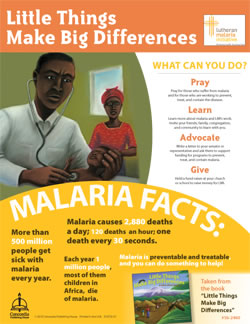
 ShapingtheFuture is published quarterly by Lutheran Education Association and distributed to members of LEA.
ShapingtheFuture is published quarterly by Lutheran Education Association and distributed to members of LEA.